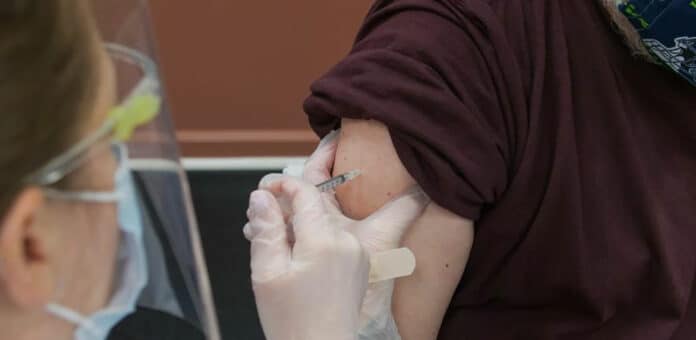A recent study has revealed that obesity plays a role in hastening the decline of immunity acquired through COVID-19 vaccination. The findings suggest that individuals with obesity may experience a faster loss of protective antibodies, potentially compromising the effectiveness of vaccination in this population.
This research sheds light on the impact of obesity on vaccine-induced immunity and highlights the need for further investigation into the mechanisms underlying this accelerated loss of immunity. Understanding the relationship between obesity and vaccine response is crucial for developing targeted strategies to optimize vaccine effectiveness and protect vulnerable populations.
Previous studies had suggested lower antibody levels in vaccinated individuals with obesity, leading to a higher risk of severe disease compared to vaccinated individuals with normal weight. This research, conducted by a team from the Universities of Cambridge and Edinburgh, analyzed real-time data from 3.5 million people in Scotland who received either the Pfizer-BioNTech or AstraZeneca COVID-19 vaccines.
The study revealed that individuals with severe obesity had a 76% higher risk of severe COVID-19 outcomes. In contrast, a modest increase in risk was observed in individuals with obesity and those who were underweight. Moreover, breakthrough infections occurring after the second vaccine dose resulted in hospitalization and death at an earlier stage in individuals with severe obesity and obesity compared to those with normal weight. These findings highlight the importance of considering obesity in vaccine prioritization policies and the need for further research to understand the underlying mechanisms.
Prof Sir Aziz Sheikh said: “Our findings demonstrate that protection gained through COVID-19 vaccination drops off faster for people with severe obesity than those with a normal body mass index. Using large-scale data assets such as the EAVE II Platform in Scotland has enabled us to generate important and timely insights that enable improvements to the delivery of COVID-19 vaccine schedules in the post-pandemic UK.”
Researchers conducted a study involving individuals with severe obesity attending the Obesity clinic at Addenbrooke’s Hospital. They compared the number and function of immune cells in the blood of these individuals to those with normal weight. The study focused on the response to a third booster vaccine dose administered six months after the second vaccine dose.
The findings revealed that, while people with severe obesity had similar levels of antibodies to the COVID-19 virus as those with normal weight, the ability of these antibodies to neutralize the virus effectively was reduced in individuals with obesity. Approximately 55% of individuals with severe obesity had unquantifiable or undetectable neutralizing capacity, compared to 12% of individuals with a normal BMI.
“This study further emphasizes that obesity alters the vaccine response and also impacts the risk of infection,” said Dr. Agatha van der Klaauw from the Wellcome-MRC Institute of Metabolic Science and the paper’s first author. “We urgently need to understand how to restore immune function and minimize these health risks.”
The study found that individuals with obesity experienced an accelerated decline in their immune response to COVID-19 vaccines. Antibody levels decreased more rapidly over time in individuals with obesity because the antibodies were not able to bind to the virus with the same strength. This accelerated waning of the humoral response put individuals with obesity at a higher risk of reduced vaccine effectiveness and breakthrough infections. The findings suggest that obesity may negatively impact the long-term maintenance of vaccine-induced immunity against COVID-19.
Individuals with severe obesity demonstrated reduced neutralizing antibody capacity six months after vaccination, potentially due to lower antibody affinities. The study also observed an accelerated waning of humoral immunity in individuals with severe obesity, leading to an increased risk of severe COVID-19 outcomes over time.
The findings suggest that additional or more frequent booster doses may be necessary to maintain protection in individuals with obesity. Lifestyle modifications, weight loss, and interventions to improve metabolic health could enhance immune responses and offer better protection against COVID-19. The high prevalence of obesity globally presents a significant challenge for healthcare systems and vaccination programs.
The ability of the antibodies to deactivate the virus was recovered in both the normal weight and highly obese groups after receiving a third (booster) dose of the COVID-19 vaccination. However, the researchers discovered that individuals with significant obesity once more experienced a faster drop in immunity, increasing their long-term risk of infection.
Dr. James Thaventhiran, a Group Leader from the MRC Toxicology Unit in Cambridge and co-lead author of the SCORPIO study, said: “It is promising to see that booster vaccines restore the effectiveness of antibodies for people with severe obesity, but it is concerning that their levels decrease more quickly, after just 15 weeks. This shows that the vaccines also work in people with obesity, but the protection doesn’t last as long.”
Prof Sadaf Farooqi from the Wellcome-MRC Institute of Metabolic Science and co-lead author of the SCORPIO study said: “More frequent booster doses are likely to be needed to maintain protection against COVID-19 in people with obesity. Because of the high prevalence of obesity globally, this poses a major challenge for health services.”
Journal Reference:
- van der Klaauw, A.A., Horner, E.C., Pereyra-Gerber, P. et al. The accelerated waning of the humoral response to COVID-19 vaccines in obesity. Nat Med (2023). DOI: 10.1038/s41591-023-02343-2
